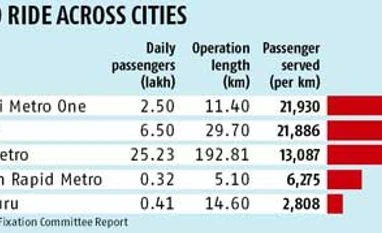The Mumbai Metro One Pvt Ltd, or MMOPL, which runs the Metro service, had sought an almost three-fold increase in fare, citing massive increase in costs, even before the service was launched in June last year.
After an introductory fare of Rs 10, MMOPL set the fare slab at Rs 10-40. While the Supreme Court upheld this revision, the Fare Fixation Committee on July 8 further revised it to Rs 110.
At present, commuters pay between Rs 10 and Rs 40 for the 11.4 km stretch from Versova to Ghatkopar, and 250,000 to 300,000 people take the journey every day, drawn by the Metro's pollution-free, air-conditioned environment.
The issue of fare has plagued the Mumbai Metro right from the start. MMOPL, a joint venture between the Anil Ambani-owned Reliance Infrastructure and Mumbai Metropolitan Region Development Authority (MMRDA) that runs the service, wants higher fare to make up for the increase in the cost of construction from Rs 2,847 crore to Rs 4,026 crore.
The state government, however, isn't prepared to do that. Chief Minister Devendra Fadnavis has said it is unfair to allow an increase in fare without an audit of the project by the Comptroller and Auditor General. He has also said that all possible legal options would be explored before the new fare is granted.
The company says the fare revision is essential due to the escalation in the project cost that was a result of a combination of factors, including changes in the initial design and layout of the Metro system, purchase of additional coaches, depreciation in the value of the rupee and delays in getting regulatory clearances. Almost 60 per cent of the additional cost has been funded through loan and the balance 40 per cent through debt.
When the project was awarded to MMOPL in 2006, the fares were fixed between Rs 9 and Rs 13, and a provision was made to increase them by 11 per cent every four years.
MMOPL, however, wants the fare to be increase substantially now. The company says its demands are in line with the basic premise of fare fixation as provided in the project report issued by the government and MMRDA, which says the Metro fares should be 1.5 times the fares charged by the Brihanmumbai Electric Supply & Transport (BEST).
Interestingly, the Fare Fixation Committee ruled in favour of increasing the fare on two grounds: one, unlike for the Delhi and Bengaluru Metro, land cost was not included while fixing the fare in the case of the Mumbai Metro. Also, it said BEST fares, the benchmark for fixing the Mumbai Metro fares, were not accurate as they were cross-subsidised by BEST's power projects.
In addition to this, the cost of securing funds for both the Delhi and the Bengaluru Metro was remarkably low. They could tie-up funds at 1 per cent interest from international funding agencies due to the sovereign guarantee provided by the Government of India. Being a public-private partnership project, MMOPL, on the other hand, has raised funds from banks at 11.75 per cent interest, and, therefore, its cost of construction is much higher.
Given the losses that R-Infra has been incurring (in the June ended quarter, it reported a net loss of Rs 50 crore), the Fare Fixation Committee concluded that customers should not mind paying a little extra for convenience to enable MMOPL to complete the project.
Even as the government insists it would not allow an increase in fare, MMOPL has sought further incentives from the government to retain the present fare slab.
Its list of demands includes a one-time capital grant of Rs 1,000 crore, a monthly subsidy of Rs 21.75 crore and rights to commercially exploit the real estate along the Metro line, which the company hopes will help it mobilise about Rs 40 crore annually in advertisement revenue.
Independent studies too have made a case for more grants to MMOPL in order to help it tide over the present crisis. The Indian Institute of Management-Ahmedabad suggested that MMOPL be given an annual subsidy of Rs 100 crore or an operating grant of Rs 1,000 crore to stop the company from bleeding.
Experts have also suggested the restructuring of MMOPL's debts to reduce the interest outgo from Rs 210 crore at present to Rs 41 crore. MMOPL has a total debt of over Rs 1,900 crore.
While the state government is yet to respond to MMOPL's letter seeking more concession, government officials agree that "some workable solutions, apart from legal options, should be discussed".
)